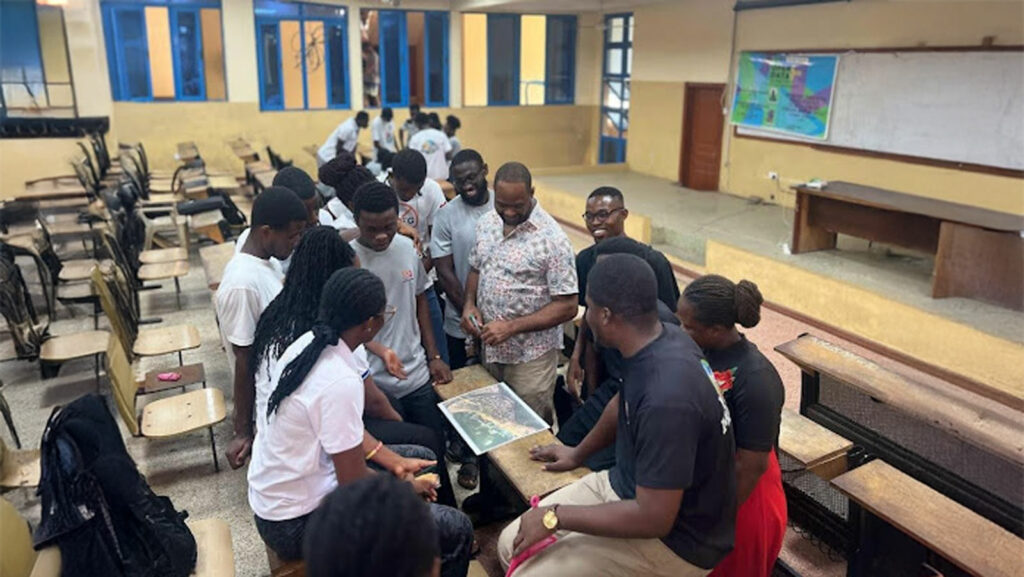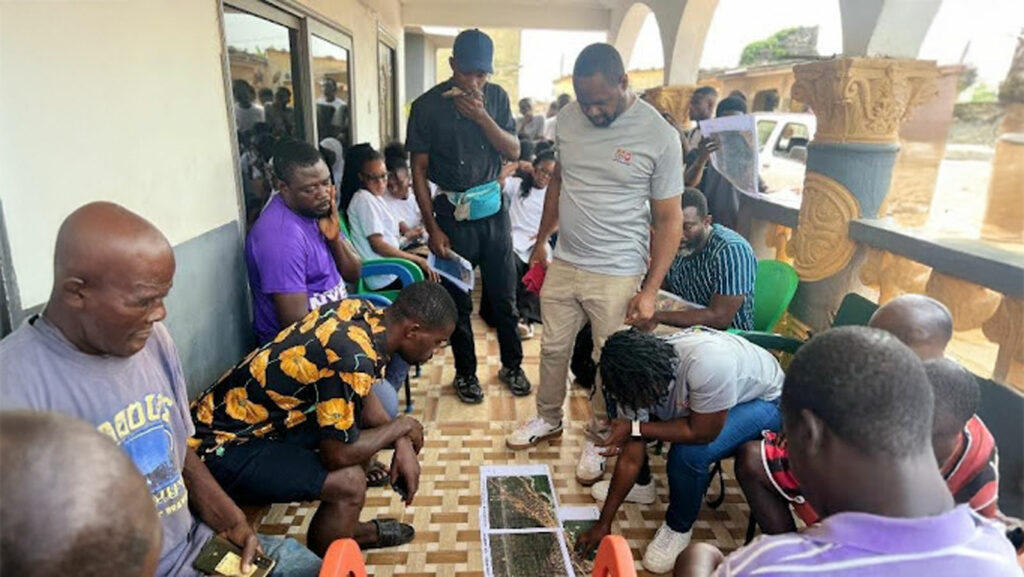
This text, part of the #ODDStories series, tells a story of Open Data Day‘s grassroots impact directly from the community’s voices.

The Inauguration
The program began on the 1st of March with a seminar centered around this year’s ODD theme, “Open Data to Tackle Poly Crises,” presented by Mr. Daniel Osei-Agyeman. The seminar was followed by a workshop on Participatory Mapping facilitated by Dr. Emmanuel Abeashi-Mensah. This session introduced the mappers to our project, “Komenda Shoreline Mapping Project – A YouthMappers Open Data Initiative,” which aimed to use open geospatial tools to map Komenda’s shoreline.
The seminar by Mr. Daniel Osei-Agyeman was particularly enlightening as it delved into various aspects of how open data can be utilized to address multiple crises simultaneously. Participants were engaged in discussions around data transparency, accessibility, and the role of open data in fostering community resilience. The insights shared during this session were invaluable, setting the stage for the subsequent workshop where mappers were equipped with the skills and knowledge necessary for participatory mapping.
Dr. Emmanuel Mensah’s workshop was a hands-on experience that emphasized the importance of community involvement in mapping projects. Participants learned how to use various geospatial tools to gather and analyze data, creating maps that accurately represent the community’s vulnerabilities and resources. The workshop was a precursor to the fieldwork, providing mappers with practical skills that would be essential for the success of the Komenda Shoreline Mapping Project.
The Grand Celebration
The celebration culminated on the 6th of March with an actual fieldwork session at Dutch Komenda. We were warmly received by the community leaders and members, who enthusiastically aligned themselves with the five groups we had created from our mappers. The entire day was dedicated to exploring different parts of the community, guided by residents, to map the characteristics of the hazard and vulnerable areas prone to coastal flooding as well as the community’s critical infrastructure and shoreline.
The fieldwork was an immersive experience that allowed mappers to apply their newly acquired skills in a real-world setting. Each group, accompanied by community members, ventured into different areas of Dutch Komenda to collect data. The mapping process involved identifying key infrastructures such as schools, hospitals, and roads, assessing their vulnerability to coastal flooding, and pinpointing areas that required immediate attention. The collaboration between mappers and community members was crucial, as local knowledge provided insights that were not immediately apparent through data alone.
One of the highlights of the fieldwork was the interaction with community leaders and residents. Their involvement was instrumental in ensuring the accuracy of the maps and the relevance of the data collected. The community’s willingness to participate and share their experiences with coastal flooding enriched the mappers’ understanding of the challenges faced by Dutch Komenda. This collaborative effort underscored the importance of community engagement in open data initiatives.

The day concluded with a refreshing gathering at Dutch Komenda beach, where participants reflected on the day’s activities. The informal setting allowed for open discussions and the exchange of ideas, fostering a sense of camaraderie between students, community youth, and leaders. The celebration was not just about data collection but also about building relationships and trust within the community, paving the way for future collaborations.
Learning and Insights
Through this project, we learned the importance of community involvement in data collection and the practical application of open geospatial tools in building coastal resilience. The community’s insights were invaluable in understanding the real-world implications of our work.
One of the key lessons was the significance of participatory mapping. By involving community members in the mapping process, we ensured that the data collected was accurate and reflective of the community’s actual needs. This approach also empowered the community, giving them a sense of ownership over the project and its outcomes. The mappers realized that open data is not just about technology but also about people and their stories. The personal experiences shared by residents brought to light the human aspect of data, reminding us that behind every data point is a real person with real challenges.
The use of geospatial tools was another crucial aspect of the project. Mappers learned how to leverage these tools to create detailed maps that highlight vulnerabilities and resources. The hands-on experience gained during the workshop and fieldwork enhanced their technical skills, making them proficient in using open data for community resilience projects. The ability to visualize data through maps provided a clearer understanding of the community’s needs, enabling mappers to propose effective solutions to mitigate the risks associated with coastal flooding.
The project also highlighted the importance of collaboration. The partnership between UCC YouthMappers, community leaders, and residents was a testament to the power of collective action. Working together towards a common goal fostered a sense of unity and shared responsibility, emphasizing that addressing poly crises requires a collaborative effort. The success of the Komenda Shoreline Mapping Project was a result of this collective endeavor, showcasing the potential of open data initiatives to bring communities together and drive positive change.
Overall, the Open Data Day 2025 celebration was a transformative experience for UCC YouthMappers. It provided an opportunity to apply theoretical knowledge in a practical setting, enhancing their understanding of open data and its applications. The lessons learned and skills acquired during this project will undoubtedly contribute to their future endeavors in community resilience and open data initiatives.
Attendance:
- Total students: 41
- Team members: 10
What’s Next?
Watch for the next phase focusing on training the youth in utilizing open digital tools to reduce the vulnerabilities they face. This training will empower them to take proactive steps in safeguarding their community against future crises.
The upcoming training sessions will be designed to equip youth with the skills needed to harness the power of open digital tools. These sessions will cover various aspects of data collection, analysis, and visualization, enabling participants to create detailed maps and reports that highlight their community’s vulnerabilities. The training will also emphasize the importance of data-driven decision-making, encouraging youth to use data to inform their actions and advocate for necessary interventions.
By empowering youth with these skills, we aim to create a generation of informed and proactive individuals who can contribute to their community’s resilience. The training will be conducted in collaboration with local experts and organizations, ensuring that participants receive comprehensive and relevant knowledge. The focus will be on practical applications, with hands-on activities that allow youth to apply what they’ve learned in real-world scenarios.
The next phase of the project will also include follow-up activities to monitor the progress of participants and provide ongoing support. Regular check-ins and feedback sessions will be conducted to address any challenges faced by participants and ensure that they are equipped to utilize open digital tools effectively. The goal is to create a sustainable model that empowers youth to continuously contribute to their community’s resilience.
Acknowledgments
We extend our heartfelt gratitude to the community of Dutch Komenda and the Department of Geography and Regional Planning for their unwavering support and collaboration.
In conclusion, the Open Data Day 2025 celebration was a beautiful journey of learning, collaboration, and community engagement. The day ended with a delightful refreshment at Dutch Komenda beach, shared by both students and the community youth, alongside some of the leaders who joined us throughout the program. This is just one facet of our commitment to building coastal resilience and contributing to a safer, more informed world.
The success of this project would not have been possible without the support of the community of Dutch Komenda. Their active participation and willingness to share their experiences were instrumental in ensuring the accuracy and relevance of the data collected. The collaboration with community leaders and residents provided valuable insights that enriched the mapping process, highlighting the importance of local knowledge in open data initiatives.
We also extend our gratitude to the Department of Geography and Regional Planning for their guidance and support throughout the project. Their expertise and resources were crucial in facilitating the training sessions and fieldwork, ensuring that mappers were well-equipped to carry out their tasks. The department’s commitment to promoting open data and community resilience was evident in their unwavering support, making them an integral part of the project’s success.
As we look forward to the next phase of the project, we remain committed to our goal of building coastal resilience through open data initiatives. The lessons learned and relationships built during the Open Data Day 2025 celebration will serve as a foundation for future endeavors, driving our efforts to create a safer and more resilient community. We are excited to continue this journey, empowering youth and fostering collaboration to address the challenges posed by poly crises.

About Open Data Day
Open Data Day (ODD) is an annual celebration of open data all over the world. Groups from many countries create local events on the day where they will use open data in their communities. ODD is led by the Open Knowledge Foundation (OKFN) and the Open Knowledge Network.
As a way to increase the representation of different cultures, since 2023 we offer the opportunity for organisations to host an Open Data Day event on the best date over one week. In 2025, a total of 189 events happened all over the world between March 1st and 7th, in 57 countries using 15+ different languages. All outputs are open for everyone to use and re-use.
For more information, you can reach out to the Open Knowledge Foundation team by emailing opendataday@okfn.org. You can also join the Open Data Day Google Group or join the Open Data Day Slack channel to ask for advice, share tips and get connected with others.








